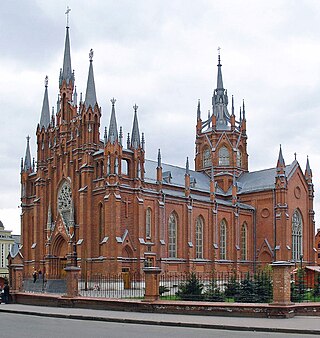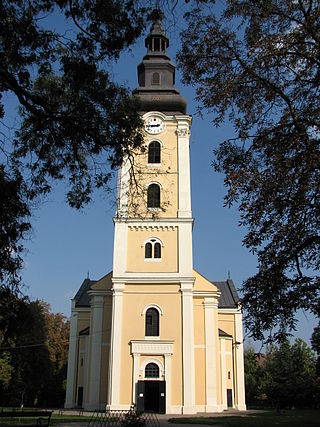Related Research Articles

In Christian denominations, an archbishop is a bishop of higher rank or office. In most cases, such as the Catholic Church, there are many archbishops who either have jurisdiction over an ecclesiastical province in addition to their own archdiocese, or are otherwise granted a titular archbishopric. In others, such as the Lutheran Church of Sweden, the title is only borne by the leader of the denomination.

In church governance, a diocese or bishopric is the ecclesiastical district under the jurisdiction of a bishop.
An ecclesiastical court, also called court Christian or court spiritual, is any of certain courts having jurisdiction mainly in spiritual or religious matters. In the Middle Ages, these courts had much wider powers in many areas of Europe than before the development of nation states. They were experts in interpreting canon law, a basis of which was the Corpus Juris Civilis of Justinian, which is considered the source of the civil law legal tradition.

An exarch was the holder of any of various historical offices, some of them being political or military and others being ecclesiastical.
Eparchy is an ecclesiastical unit in Eastern Christianity that is equivalent to a diocese in Western Christianity. An eparchy is governed by an eparch, who is a bishop. Depending on the administrative structure of a specific Eastern Church, an eparchy can belong to an ecclesiastical province, but it can also be exempt. Each eparchy is divided into parishes, in the same manner as a diocese in Western Churches. Historical development of eparchies in various Eastern Churches was marked by local distinctions that can be observed in modern ecclesiastical practices of Eastern Orthodox Churches, Oriental Orthodox Churches and Eastern Catholic Churches.

In Christian churches with episcopal polity, the rank of metropolitan bishop, or simply metropolitan, pertains to the diocesan bishop or archbishop of a metropolis.
An ecclesiastical province is one of the basic forms of jurisdiction in Christian Churches with traditional hierarchical structure, including Western Christianity and Eastern Christianity. In general, an ecclesiastical province consists of several dioceses, one of them being the archdiocese, headed by a metropolitan bishop or archbishop who has ecclesiastical jurisdiction over all other bishops of the province.

The hierarchy of the Catholic Church consists of its bishops, priests, and deacons. In the ecclesiological sense of the term, "hierarchy" strictly means the "holy ordering" of the Church, the Body of Christ, so to respect the diversity of gifts and ministries necessary for genuine unity.

The Catholic Church in Russia is part of the worldwide Catholic Church, under the spiritual leadership of the Pope in Rome.

The Greek Catholic Churchin Hungary or Byzantine Catholic Churchin Hungary is a metropolitan sui iuris ("autonomous") Eastern Catholic particular church in full communion with the Roman Catholic Church. It is headquartered in Debrecen. Its liturgical usage is that of the Byzantine Rite in the Hungarian language.

In the Catholic Church, a bishop is an ordained minister who holds the fullness of the sacrament of holy orders and is responsible for teaching doctrine, governing Catholics in his jurisdiction, sanctifying the world and representing the Church. Catholics trace the origins of the office of bishop to the apostles, who it is believed were endowed with a special charism and office by the Holy Spirit at Pentecost. Catholics believe this special charism and office has been transmitted through an unbroken succession of bishops by the laying on of hands in the sacrament of holy orders.
The Holy Synod of the Coptic Orthodox Church of Alexandria is the highest Orthodox authority in the Coptic Orthodox Church. It formulates the rules and regulations regarding matters of the Church's organisation and faith.

The Roman Catholic Archdiocese of Dhaka is the Latin, main Metropolitan Metropolitan diocese of the Roman Catholic Church in Bangladesh, but no longer the only one. It still depends on the missionary Roman Congregation for the Evangelization of Peoples.
The Major Archeparchy of Kyiv–Galicia (Kyiv–Halych) is an ecclesiastical territory or ecclesiastical province of the Ukrainian Greek Catholic Church — a particular Eastern Catholic Church, that is located in Ukraine. It was erected on 21 August 2005 with the approval of Pope Benedict XVI. There are other territories of the Church that are not located in Ukraine. The cathedral church — the Cathedral of the Resurrection of Christ — is situated in the city of Kyiv. The metropolitan bishop is — ex officio — the Primate of the Ukrainian Greek Catholic Church. The incumbent major archbishop is Sviatoslav Shevchuk.

The Archeparchy of Lviv is an ecclesiastical territory or ecclesiastical province of the Ukrainian Greek Catholic Church — a particular Eastern Catholic Church, that is located in Ukraine. It was erected in 1807. As a metropolitan see, it has three suffragan sees: Stryi, Sambir-Drohobych, and Sokal–Zhovkva. The incumbent Metropolitan Archbishop is Ihor Vozniak. The cathedral church of the archeparchy is St. George's in the city of Lviv.
The Apostolic Vicariate of Beirut is a Latin Church ecclesiastical jurisdiction or apostolic vicariate of the Catholic Church in Lebanon, where Eastern Catholics are far more numerous. In 2010, there were 15,000 baptized. Its current bishop is Cesar Essayan.
References
- ↑ Britannica: Metropolitan (ecclesiastical title)
- ↑ Catholic-hierarchy.org
- ↑ Code of Canons of the Eastern Churches, canon 155 §1
- ↑ "John D. Faris, The Eastern Catholic Churches: Constitution and Governance (Saint Maron Publications, New York 1992), p. 376" (PDF). Archived from the original (PDF) on 2017-08-20. Retrieved 2017-07-09.